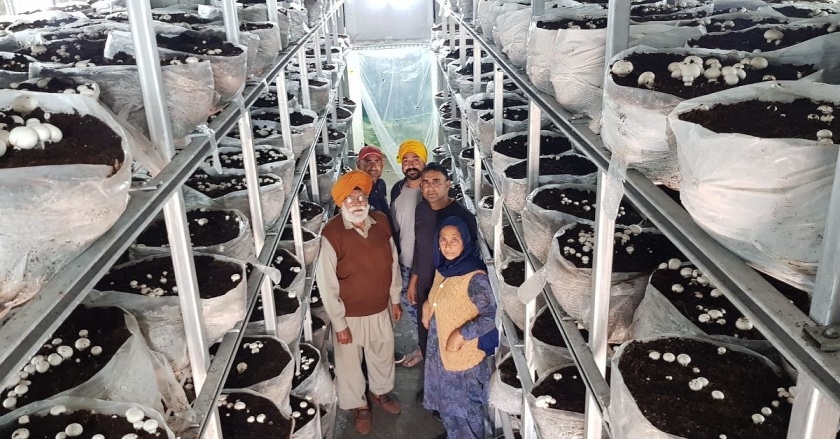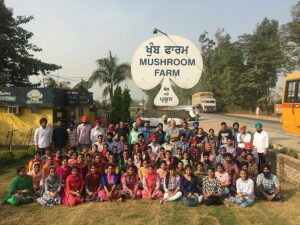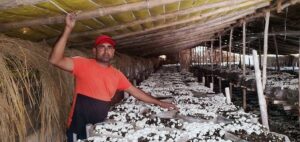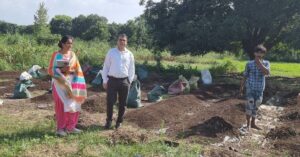At 66 She Started a Mushroom Farming Biz; 30 Yrs Later Her Sons Carry On Her Legacy
Started by Harjinder Kaur in 1989, Punjab-based Randhawa Mushroom Farm cultivates 12 varieties of the fungi. Mandeep, Manjeet and Harpreet Singh now continue the thriving business.

In 1989, 66-year-old Harjinder Kaur Randhawa began cultivating mushrooms as a hobby in her courtyard, in Dhardeo village of Amritsar district of Punjab, to support the family income. More than 30 years down the line, three of her sons have successfully built a niche brand synonymous with premium mushroom produce and processed foods in their neighbourhood.
Trained at the Directorate of Mushroom Research in Solan, Himachal Pradesh, Mandeep Singh (41) and his brothers grow as many as 12 varieties of mushroom at Randhawa Mushroom Farm on the Batala-Jalandhar Highway in Dhardeo. Not only do the premises have air-conditioned rooms to ensure all-year-round production, they also have a wholesale unit with cooling facilities for storing up to eight quintals of the vegetable, in addition to a retail outlet.
“Be it growing mushrooms or selling them, the role of each brother is different. My elder brother, Manjeet Singh, handles primary production duties, while my younger brother, Harpreet Singh, handles spawn-production and processing. I oversee operations concerning marketing, banking, and media. Our mother supervises the workers on the farm. Another of our brothers is based in Australia and grows sugarcane and bananas, but he, too, lends us a helping hand whenever he’s here,” Mandeep tells The Better India.
Different species such as button mushrooms, oyster mushrooms (pink, white, yellow and brown) and milky mushrooms are grown at their farm. The mushrooms are also used for in-house production of pickles, biscuits, papad and namkeen, which are processed at the plant and canned by a third-party company.
Notably, Mandeep received an award from the Indian Council of Agriculture Research (ICAR) in 2017 for his significant contribution in the field of mushroom diversification.
‘No one can do this work better than women’

Up until last year, Randhawa Mushroom Farm had a hundred employees, of which 98 per cent were women, says Mandeep.
“Currently, we have around 60 workers, of which only four are men. This is because cultivation of mushrooms can be very challenging and the smallest details require special attention. We believe that no one can do this work better than women and that’s why they’re given priority in hiring decisions,” he adds.
Mandeep explains, “While my father worked as a Punjab Police officer, my mother used to sell sweaters she weaved herself. Gradually, the demand for readymade sweaters increased in the market and my mother stopped her business. After consulting the Punjab Agricultural University, she decided to start cultivating mushrooms on a very small scale. At the time, however, the vegetable was not very popular and it was very difficult to sell it in the market.”
He recalls, “When my father tried to sell mushrooms for the first time, the shopkeeper at the mandi claimed that people in the city were getting sick after eating our mushrooms, and asked him to sell them at an even lower rate. Still, my mother did not lose heart and entrusted her sons with the responsibility of directly selling our produce. I remember us cycling to the state highway to approach potential customers.”
Over time, the Randhawa family’s produce gained goodwill and business was steady. In 2001, however, their mushrooms were infected with a plant disease called Wet Bubble and the entire crop was ruined. Agricultural scientists advised the family not to cultivate mushrooms at the same land for at least four years and shift the production elsewhere.
Mandeep adds, “It was a tough time for us, but we did not stop. We began growing mushrooms on the four acres of land we owned near the Batala-Amritsar road, two kilometres away from our home. We had considerable production in the first batch itself, but didn’t receive good rates in the market. So, we began our own retail outlet to ensure maximum profits.”
Soon, they started cultivation in air-conditioned rooms. “Earlier, we used to grow mushrooms through a ‘hut system’, but production was only possible during winters,” he says, adding, “We set up an indoor composting plant with the help of a state government grant. The machine-oriented cultivation work is carried out in 12 air-conditioned rooms and ensures both quicker and all-year-round production. We also make use of tissue culture techniques.”
“As a farmers’ family, we do not involve any external traders or middlemen, and realise the importance of determining the price of our produce ourselves. If our consumers find the price appropriate, they buy it, otherwise we direct the produce to the processing unit,” he says.
Besides Amritsar, Randhawa Mushroom Farm’s processed foods are in demand in cities such as Jalandhar, Gurdaspur, Batala and Pathankot.
Encashing on Mushrooms

While Randhawa Mushroom Farm has previously recorded an annual turnover of as much as Rs 3.5 crore, the COVID-19 pandemic impacted their sales. “Before the lockdown, we used to be able to sell at least 70 per cent of the produce at our outlet and directed the rest to the mandi. However, sales have now dropped to about 40 per cent,” says Mandeep.
“We’re trying to make up for the losses with the same approach that we’ve already been using in our pricing model. We don’t sell mushrooms for less than Rs 100/kg, however, if the market price falls below the standard price, we use the produce to make mushroom pickle instead, which has been a consistent crowd-favourite among our thousand customers,” he explains.
In order to increase their consumer base, Randhawa Mushroom Farms is also set to introduce a weekly-delivery system by March 2022. Customers from as many as seven districts of the state will be able to sign up for mushroom-deliveries on a particular day of the week of their liking.
“Today, the condition of farmers in the country is less than ideal. To overcome their financial troubles, they should also cultivate advanced crops as it makes for a steady source of alternative income,” says Mandeep.
He also sells mushroom compost to farmers in the area so they can grow the vegetable without much hassle.
“The farmers’ community should focus on self-marketing because it helps in developing confidence to demand the right price for their produce. We should also prepare school students for agricultural work from the very beginning, so that the coming generation can inculcate an interest in farming and consider it as a career,” he adds.
For purchase inquiries and further information, you can visit Randhawa Mushroom Farm’s website or contact Mandeep Singh here.
Read this story in Hindi here.
(Edited by Yoshita Rao)
If you found our stories insightful, informative, or even just enjoyable, we invite you to consider making a voluntary payment to support the work we do at The Better India. Your contribution helps us continue producing quality content that educates, inspires, and drives positive change.
Choose one of the payment options below for your contribution-
By paying for the stories you value, you directly contribute to sustaining our efforts focused on making a difference in the world. Together, let's ensure that impactful stories continue to be told and shared, enriching lives and communities alike.
Thank you for your support. Here are some frequently asked questions you might find helpful to know why you are contributing?


This story made me
-
97
-
121
-
89
-
167














